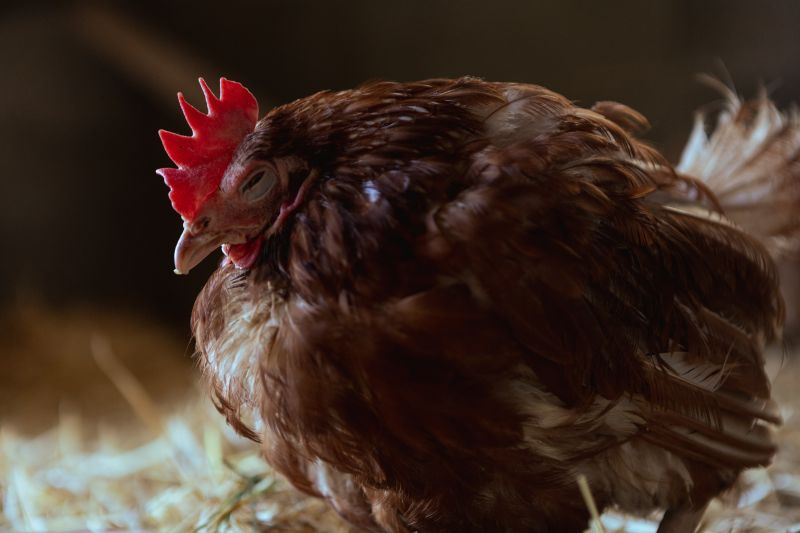Did you know that chickens can sleep up to 8 hours a day? While that may not seem like a lot by human standards, chickens need enough rest to stay healthy and productive. Understanding how do chickens sleep and why it is crucial for their health can be the difference between a healthy and tired flock.
In this article, we will explore chicken sleeping positions, sleep patterns, the role of light and darkness, and how to promote better sleep in chickens.
We will also examine some unusual sleep behaviors and what they mean.
Key Takeaways
- Chickens sleep in various positions, including on their sides, curled up in a ball, or with one foot tucked under their wing.
- Adequate sleep is crucial for good health and productivity in chickens.
- Optimal lighting is essential for chickens to sleep at appropriate times.
- Chickens huddle together and seek secure areas to protect themselves while sleeping.
Chicken Sleeping Positions Explained
Chickens sleep in various positions, such as on their sides, curled up, or with one foot tucked under their wing. Flock dynamics and roost design are important factors in determining the sleep postures of chickens.
Chickens typically sleep in a group, which provides them with warmth and safety. The roost design must also be considered, as the chickens must be able to perch comfortably. This can influence the body posture the chickens take when they sleep.
Additionally, depending on the temperature and other environmental conditions, chickens change their posture throughout the night. Generally, chickens will sleep while standing up, but they may also move to the ground if the temperature drops or they feel threatened.
The sleeping postures of chickens can also change depending on the age and health of the bird. Younger chicks often sleep more on their side or curled up in a ball, while older birds are more likely to sleep with one foot tucked under their wing.
Understanding Chicken Sleep Patterns
Understanding chicken sleep patterns is an integral part of studying avian biology. Chickens are diurnal, meaning they are most active during the day and sleep at night. To get a good night’s rest, chickens roost in a high, safe place. Roosting habits vary between breeds, but all chickens typically sleep in the same general area.
The average sleep duration for chickens is around 8-10 hours. However, this amount can vary depending on the breed, age, health, and environmental conditions. Light is also a factor in determining when chickens go to sleep. Chickens often adjust their sleep patterns to the changing light levels of the seasons.
Like humans, chickens can also suffer from sleep deprivation, leading to increased stress levels, poor health, and reduced egg production. To ensure chickens get the rest they need, providing them with a comfortable, safe, and predator-free sleeping environment is essential.
The Impact of Sleep on Chicken Health and Productivity
Adequate and restful sleep is essential for chickens to maintain good health and productivity. Chickens typically sleep in short periods throughout the day and night, with most of their sleep occurring at night. Their natural napping habits, food intake, and roosting preferences all influence the amount of sleep they get.
When chickens lack quality sleep, they are more prone to health issues, such as fatigue, weakened immune systems, and increased susceptibility to disease. In addition, chickens can become less productive and produce fewer eggs or lower-quality meat.
This means that it is important to closely monitor the sleep patterns of chickens to ensure they are getting enough rest. Regular check-ups and appropriate food intake can help ensure chickens get enough sleep and stay healthy and productive.
The Role of Light and Darkness in Chicken Sleep
Light and darkness are essential factors that affect the amount and quality of sleep chickens receive. Optimal lighting is necessary to ensure chickens can sleep at the appropriate times. This includes providing consistent light and dark cycles that mimic natural rhythms.
Additionally, chickens may benefit from bedtime routines. This could include reducing light exposure in the evening or providing a consistent time for sleeping. These strategies can help chickens get quality rest and help them stay healthy and productive.
Providing chickens with the right light and darkness conditions can significantly improve their sleep.
How Chickens Protect Themselves While Sleeping
Chickens have evolved a variety of strategies to protect themselves while sleeping, including huddling together and seeking out secure areas. Chickens’ nightly routines are based on instinct; they usually begin roosting as soon as the sun goes down.
Roosting habits vary depending on the breed, but the general idea is to find the highest spot possible to be safe from predators and other dangers. This could be in trees, on branches, or sometimes on the ground. The chickens will then huddle together and tuck their heads under their wings, which helps them stay warm and conserve energy.
They will also take turns keeping watch, with one chicken staying awake while the others sleep. This helps protect them from any potential predators that may be lurking in the dark.
Unusual Chicken Sleep Behaviors and What They Mean
Unusual behaviors in chickens during sleep can provide insight into the health and well-being of the flock. It is important to avoid keeping chickens awake for extended periods as it can cause exhaustion and negatively impact their health. Chickens need regular roosting opportunities, which involve sleeping in an elevated and protected spot. During their sleep, chickens may take short naps, as their bodies require regular rest to stay healthy.
Another unusual behavior in chickens is sleeping with one eye open. This is a survival technique the chicken uses to stay alert and aware of potential predators. Chickens also sometimes sleep with their heads and necks tucked under their wings. This is thought to help them stay warm and protected from the elements.
It is, therefore, important to watch for these behaviors when observing chickens and ensure they are getting enough rest.
Sleep Disorders in Chickens: What to Look For
Sleep disorders in chickens can significantly impact their health and well-being, and it is important to be aware of them.
One of the most common sleep disorders is caused by barnyard noises, such as dogs barking, cats meowing, or other loud noises. These noises can cause chickens to become stressed and cause them to have difficulty sleeping.
Chickens may also suffer from sleep disorders due to improper roosting habits. Chickens naturally roost or sleep in high places to protect themselves from predators. However, if they are not roosting in an appropriate location, they may have difficulty falling and staying asleep.
To help chickens sleep better, providing a safe and quiet environment is essential. Additionally, ensure that chickens have an appropriate roosting location. By doing so, you can help ensure that chickens get the quality rest they need.
Practical Tips for Promoting Better Sleep in Chickens
Providing comfortable bedding and encouraging appropriate roosting habits are essential to promoting better sleep in chickens. To ensure chickens have a good night’s sleep, create a quiet and secure space. Ensure the bedding is soft and dry, and provide roosting bars or branches for chickens to perch on.
Pay attention to the chickens’ behavior and recognize signs of fatigue, such as yawning or drooping eyelids. Adjust the sleeping environment as needed to ensure the chickens are getting enough rest. Additionally, pay attention to the number of daylight hours, as chickens need a certain amount of darkness to sleep.
Frequently Asked Questions:
How Much Sleep Does a Chicken Need?
Chickens need an average of 8-10 hours of sleep each day, although this can vary depending on the breed and their foraging habits. They often congregate in groups and use nesting to stay warm while sleeping. Chickens are most active during the day and typically sleep at night. During winter, chickens may sleep longer due to the colder weather. In addition, chickens may take short naps throughout the day, especially if they have been foraging or engaging in other strenuous activities.
Providing a safe, comfortable sleeping environment is essential to ensure chickens get the rest they need.
Can Chickens Sleep With Other Animals?
Yes, chickens can sleep with other animals. The dietary needs and social behavior of chickens should be taken into consideration. Chickens should not be housed with animals that could harm them or eat their food, such as larger birds, rodents, or cats. They also require a diet higher in protein than other animals, so they should not be kept with animals with different dietary needs.
Chickens may sleep better when housed with other animals, as they are social creatures that can benefit from companionship. However, it is important to keep the safety of all animals in mind before housing them together.
What Is the Best Way to Set up a Chicken’s Sleep Area?
When setting up a sleeping area for chickens, it is important to consider the bedding requirements and light exposure. The sleeping area should have a deep bedding layer to provide insulation and cushioning.
Ensuring chickens have darkness in their sleep area is also important, as light exposure can disrupt their sleep. You may need to use curtains or a cardboard box to block out light.
Additionally, the sleeping area should be away from noise or other distractions that could disturb the chickens.
With these considerations in mind, you can ensure your chickens have a comfortable and secure sleep area.
What Are the Signs of Sleep Deprivation in Chickens?
Like other animals, chickens require quality and quantity of sleep to remain healthy. Signs of sleep deprivation in chickens include changes in their nighttime habits, decreased overall energy levels, and increased aggressive behavior. Additionally, chickens can become more susceptible to sickness and disease if they are not getting enough sleep.
Poor nutrition can also play a role in chickens experiencing sleep deprivation. It is crucial to provide chickens with a comfortable and safe sleep area and a balanced diet to ensure they get enough rest.
Can Chickens Sleep With Their Eyes Open?
Do chickens sleep with their eyes open? This is something that has been debated for a long time.
Generally speaking, chickens cannot sleep with their eyes open. However, they can enter a state of light sleep known as ‘dozing’ while still being alert to their surroundings. This is usually done while roosting, and it is also influenced by their natural light cycle.
Therefore, although chickens do not sleep with their eyes open, they can remain alert to their environment even when resting.
Conclusion
Like their human counterparts, chickens need adequate sleep to remain healthy and productive. While their sleep positions, patterns, and behaviors vary, chickens require a balance of light and darkness and an environment free from danger to get the sleep they need.
By understanding the unique needs of chickens, we can help them achieve restful sleep and reap the benefits.
Metaphorically, proper sleep for chickens is like a cocoon, providing the security they need for growth and success.

